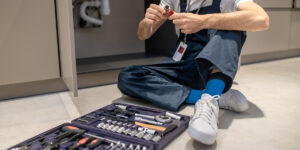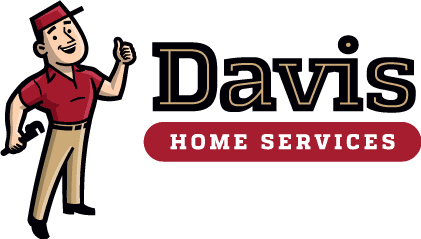Professional Plumbers Debunk 7 Plumbing Myths
Your plumbing system is integral to your home’s day-to-day functioning. When your system works well, you enjoy on-demand service for your irrigation, hygiene, cooking, and wastewater needs. If your plumbing system fails, you may experience flooding, damage, and loss of a critical utility.
 If you suffer plumbing system failure, you’ll need immediate assistance. At Davis Home Services, our plumbing technicians in Voorhees, NJ, put their skills and experience at your disposal. Our technicians quickly restore access to your toilet, sinks, irrigators, and more.
If you suffer plumbing system failure, you’ll need immediate assistance. At Davis Home Services, our plumbing technicians in Voorhees, NJ, put their skills and experience at your disposal. Our technicians quickly restore access to your toilet, sinks, irrigators, and more.
To keep your plumbing system in good shape, you should not buy into everyday plumbing myths that claim to solve various issues. All too often, well-meaning repairs based on such tales result in inadvertent damage.
Beware of These Common Plumbing Myths
Heat Keeps All Your Pipes Safe
Pipes serve as the circulatory system of your home plumbing network. If you live in areas with cold winters, you may believe that heat from your furnace will keep all of your pipes from freezing. Unfortunately, this notion is not always true.
Some houses have unusual plumbing pipe networks that run close to the outside walls. Other pipes mount under unprotected sinks in basements and similar areas. Because of their proximity to the outside, such pipes may freeze even in otherwise well-heated homes.
To prevent freezing, it’s always a good idea to consult with trained professionals before winter arrives.
It’s No Problem to Pour Grease Down Drains
After cooking a meal, it is easy to pour grease from pots, pans, and planes down the drain. Because this grease is in a liquefied form during disposal, it may seem that getting rid of it in this way is no problem. In reality, making a habit of this puts your plumbing system under stress.
Some types of oil and grease maintain their liquid form even at room temperatures. Many other types of lard-like fat are liquid when warm but congeal into solids when cold. Large quantities of this grease can form nearly intractable clogs in drains and underlying pipes.
To avoid this outcome, never pour thick cooking grease into drains. Garbage disposal is the best way to get rid of the grease.
Pipes Stay Clear If No Solids Enter
Suppose you are a neat person around the kitchen and avoid disposing of solid material in the drain. In that case, you may think that your pipes will always remain clear. However, your drainage pipes will likely lose some capacity over time.
After long-term drain use, deposits of minerals and other materials build up on the lining of plumbing pipes. Given enough time, this build-up can accumulate to complete blockage. This build-up can happen in different areas of the house, including kitchen drains, toilet pipes, and bathtub drains.
This material build-up in your pipes may be inevitable, but you don’t have to put up with it. During inspection visits, our highly experienced plumbing technicians ensure that your drains are free of obstructing materials.
Flushing Wipes Causes No Problems
Many people flush wipes down the toilet in addition to toilet paper. Some flushing wipe brands claim that the material they use is flushable. However, this claim isn’t entirely accurate.
While many washing wipes may be fragile, they are not necessarily soluble in water. As a result, they don’t quickly break down when they get wet. Thus, when you flush them down your toilet, they can collect into pockets and form tough obstructions.
To avoid costly drain-cleaning repairs, safely dispose of flushable wipes in areas other than toilets.
Baking Soda and Vinegar Are Good for Drains
Another common plumbing myth is that mixtures of certain substances make good homemade drain cleaners. One common combination is baking soda and vinegar. Some people mix these ingredients and pour them down the drain in an attempt to clear their pipes.
In reality, a mixture of vinegar and baking soda does not make a good drain and pipe cleaner. Putting these substances together creates a fizzy liquid, but this product does little to alleviate drainage problems. In fact, this liquid often mixes with existing sludge to form even tougher blockages.
Using drain cleaners isn’t necessarily the best way to clear plumbing pipes. If you use them, stick to respected brands and avoid baking soda/vinegar mixtures.
Drip Leaks Aren’t Serious
If you’ve ever experienced a leaky faucet, you know how irritating it is. At the same time, these minor leaks often don’t seem to be worth too much attention. Unfortunately, this concept is one of the most widespread plumbing myths.
Usually, drips and leaks that persist for long periods indicate a deeper problem. Plumbing systems include dozens of important components, and any one of them can be at fault. Indeed, constant drips often indicate many plumbing issues.
Another issue with leaks is physical damage. Small, unresolved drips that fall upon damp areas can result in mildew, mold, and moisture damage. If you notice a small leak that you can’t seem to stop, it’s time to call a professional.
DIY Plumbing Is Easy
It may seem that plumbing consists of knowing how to manipulate valves and pipes and fix leaks. In reality, the plumbing trade is a vastly complex one. Master plumbers spend many years training and perfecting the details of the craft.
Because of their skill and experience, master plumbers complete immensely complex installation and maintenance tasks. At the same time, they know how to do the seemingly smallest jobs correctly. Nothing substitutes for the valuable skills professional plumbers bring to the table.
Benefit from Professional Plumbing Services
At Davis Home Services, we’re happy to support our customers in a wide variety of ways. You can count on us for fast, 24/7 emergency plumbing coverage and repairs in Voorhees, NJ. At the same time, we can help you design, install and maintain a brand-new system.
Now that you know more about plumbing myths, you may also like to learn about the history of indoor plumbing. For more information and a free consultation, call us now at 844-226-9872.

